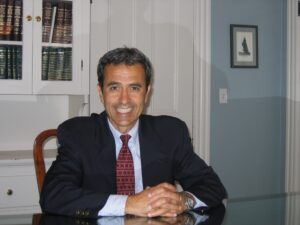By Tom Jarvis
Looking back through the history of the New Hampshire Bar Association in celebration of its 150th year inevitably brings to mind the most publicized trial in Granite State history: the Pamela Smart trial. Spanning 14 days, it was the first trial in the nation to be broadcast live on television from start to finish, gavel to gavel.
In March 1991, 22-year-old Pamela Smart was found guilty of conspiracy to commit murder, accomplice to first-degree murder, and witness tampering in connection with the death of her husband, Greggory Smart, who was found shot to death in their home in Derry on May 1, 1990.
She was the media coordinator at Winnacunnet High School in Hampton and began having an affair with a 16-year-old student, William Flynn. Smart was accused of convincing Flynn and three of his friends to kill her husband. Flynn and the others pleaded guilty in a cooperation agreement in exchange for lesser charges, while Smart was sentenced to life in prison.
By 2015, Flynn and his friends had all been released from prison. Smart has requested commutation three times – the most recent in 2022 – and each petition has been unanimously denied by the Executive Council.
What made this trial so infamous was the media frenzy that ensued. Its popularity even inspired the creation of two films. One was a made-for-TV movie called Murder in New Hampshire: The Pamela Smart Story, which starred Helen Hunt and Chad Allen. The other, only loosely based on the Smart story and with changed names and details, was called To Die For, and starred Nicole Kidman and Joaquin Phoenix. There were also several books and two documentaries made about the Smart story.


“It was a case of first impression with regard to media exposure,” Smart’s long-time attorney Mark Sisti says. “I guess anytime there is a first, it’s going to attract attention for a long period of time. And it was not only national coverage. There were news trucks from Japan, Germany, and Australia. The thing got completely out of control. I don’t think there was a trial since then in this state that allowed for such a bizarre media circus.”
Paul Twomey, Sisti’s former law partner and former co-counsel for Smart, believes her trial was the impetus to Court TV.
“It was oppressive. I don’t think I’ve ever seen anything like it since,” Twomey says. “The media was everywhere. They would follow us to court – we’d be like 40 miles away from the court and people would be following us. I think it was profoundly disturbing, the atmosphere in that courtroom – the way it just got completely out of control. I liked Judge [Douglas] Gray a lot, he was always one of my favorite judges, but I think the thing got away from him.”
Twomey continues: “I just can’t even tell you how strange it was to have judges and politicians come in and be seated in special spectator seats for VIPs, watching the trial of a human being. A real person died – they have a family. It wasn’t entertainment; it shouldn’t have been entertainment. It was something that shouldn’t have happened. She’s a real human being, and she’s on trial for her life. These kids all had families. All of them shouldn’t have been shown. I feel bad for the kids, too. I feel bad for Billy Flynn and his mother and the rest of the kids. The whole thing was awful.”
According to Twomey, it wasn’t long after the Pamela Smart trial that the courts began implementing rules to control the media coverage in court.
“The OJ Simpson thing was somewhat similar a year or two later, but even then, there were more rules in place,” he says.
Paul Maggiotto, who was the assistant attorney general and lead counsel for the State at the time of the trial, says he wasn’t worried about the press.
“It was clearly unprecedented, the amount of press coverage,” Maggiotto says. “I think what people believed is that there is a great interest in watching a trial live. I remember kids in high school later coming up to me and telling me they watched it in school as a lesson in civics. So, it had a real educational benefit by being broadcast live. [At the time of the trial], I was new to the office. I had been a district attorney in Brooklyn and had tried about nine homicide trials before I even got to New Hampshire, and because of that experience, I had a lot of comfort level with the press. The fact that there was a lot of press involved did not scare me away, where I think some of the people in the office wanted nothing to do with it for that reason.”
Maggiotto began working as a defense attorney two years after the trial and now operates a solo practice in Concord. When asked how the Smart trial affected his career going forward, he says it gave him some name recognition at times.

“When I put my name on the door and stopped working for other people, it certainly gave me some recognition that I otherwise wouldn’t have had,” he says. “But as a defense lawyer, you’re only as good as your latest victory, so to speak. Clients want you to win, they want you to do well for them, so they don’t really care about what you might have done in the past.”
Maggiotto says he is proud of his work on the Smart trial, but he’s prouder of the appellate work in the case because that was more out of his comfort zone.
“There are other cases that have given me a lot of satisfaction and pride,” he says. “Smart was one of them, but it’s not like leaps and bounds above the others.”
Sisti says he is also proud of the work he did for Smart and the work that he continues to do for her.
“We are going to latch on, we’re going to hold, and we are going to succeed in the end. I am confident of that,” Sisti says. “I take pride in the craft that I am engaged in. There are a lot of lawyers out there doing the same stuff I’m doing that are not getting this attention, and they’re in the trenches every day. We should be proud of what they’re doing. As assigned council in criminal cases, as public defenders – they don’t get any kind of glory, they don’t get any kind of attention, but they are battling every day. My hat goes off to them. They’re in there, they’re fighting, and they’re doing the right thing.”
In February 2023, Sisti appeared before the New Hampshire Supreme Court, asking them to compel the Executive Council to reconsider a full hearing on Smart’s commutation petition. Sisti argued that Governor Sununu and the Executive Council did not fairly consider her request, having only reviewed it for under three minutes before rejecting it. The Court denied Smart’s petition.
“She’s more than happy to sit down in front of any or all of the executive counselors and the governor and look them straight in the eye and answer any questions they would want to offer to her,” Sisti says. “She’s not afraid of them. It seems as though they are afraid of her. I think one of the fears that they may have is that they’re actually witnessing somebody that has been a rehabilitation success, and now they don’t know what to do with her.”

Sisti says they are preparing for the next commutation request.
“We are not stopping,” he says. “I’m assembling support for her now. We’re hoping we can get a hearing – a fair hearing. We hope that the Executive Council and the governor would be gracious enough to extend that time to us – more than two minutes and 34 seconds – and sit down and have an honest, true, and full hearing so that the public understands what’s going on, so that the electorate that put them in office understand what their true position is. Then, we can all sit back, and we can judge Pam Smart after we all examine her achievements and can ask piercing questions with regard to her rehabilitation and remorse, instead of conjecture. We have to take this thing out of the media, we have to take this thing out of the politics, and we have to start to judge her as a human being – just like our constitution in the state would direct us to do.”
Mark Sisti and Paul Maggiotto both appear in the brand new episode of the Bar Discourse (the NHBA’s podcast), wherein they have a more in-depth and candid conversation about the Pamela Smart trial, the media frenzy surrounding it, how it affected their careers, the movies and books made about the trial, and more. You can listen to the episode now at soundcloud.com/thebardiscourse.
